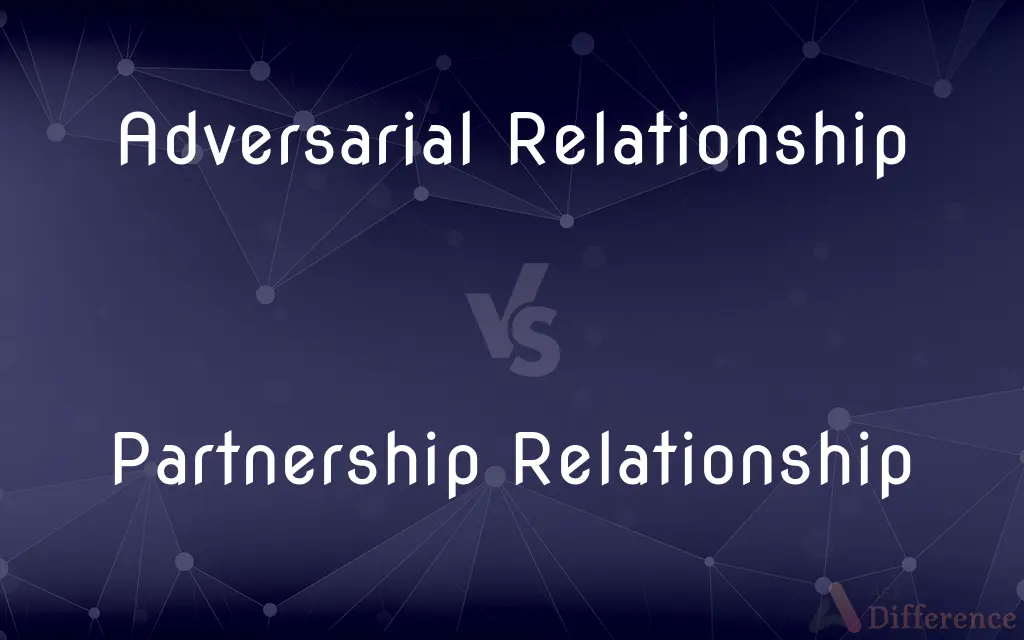Adversarial Relationship vs. Partnership Relationship — What's the Difference?
Edited by Tayyaba Rehman — By Fiza Rafique — Published on January 13, 2024
Adversarial Relationship involves opposition or conflict, while Partnership Relationship centers on collaboration and mutual benefit.

Difference Between Adversarial Relationship and Partnership Relationship
Table of Contents
ADVERTISEMENT
Key Differences
An Adversarial Relationship often denotes a scenario where parties stand in opposition, generally due to conflicting interests or goals. This type of relationship can be seen in litigation where one side seeks to prevail over the other, emphasizing competitive dynamics. On the other hand, a Partnership Relationship embodies mutual understanding, shared goals, and collaboration. Here, parties work together to achieve a common objective, prioritizing teamwork and shared success.
In an Adversarial Relationship, communication can be tense, and trust might be minimal. Parties are more inclined to protect their individual interests, which can lead to disputes or confrontations. Contrastingly, in a Partnership Relationship, communication is open and transparent. There's an inherent trust, fostering a conducive environment for both parties to discuss and strategize together.
An Adversarial Relationship can be draining, both emotionally and resource-wise, as it often involves struggles, misunderstandings, or even battles. This type of relationship may yield winners and losers. In contrast, a Partnership Relationship is generally uplifting and productive. Both parties aim for a win-win scenario, ensuring that each side benefits from the association.
While Adversarial Relationships might occasionally be necessary, especially in legal or competitive settings, they might not be sustainable in the long run. The continuous opposition can lead to burnout or breakdowns. Conversely, Partnership Relationships, built on trust and collaboration, tend to be enduring and are often preferred in contexts like business, where long-term growth and sustainability are essential.
Comparison Chart
Nature
Oppositional and confrontational
Collaborative and cooperative
ADVERTISEMENT
Communication
Tense, guarded
Open, transparent
Outcome
Win-lose
Win-win
Trust Level
Low, often minimal
High, based on mutual understanding
Longevity
Potentially short-lived
Tends to be enduring and sustainable
Compare with Definitions
Adversarial Relationship
Such relationships often see parties standing in stark contrast to each other.
The teams' Adversarial Relationship was evident in their heated debates.
Partnership Relationship
This relationship ensures both parties benefit and prioritize each other's success.
Their Partnership Relationship ensured that both companies thrived in the competitive landscape.
Adversarial Relationship
It denotes a connection where parties are more inclined to compete rather than cooperate.
The political rivals maintained a strong Adversarial Relationship throughout the campaign.
Partnership Relationship
It signifies a connection based on trust, shared objectives, and joint efforts.
Their Partnership Relationship resulted in groundbreaking innovations in technology.
Adversarial Relationship
Represents a relationship based on disputes, confrontations, or disagreements.
The neighbors had an Adversarial Relationship due to the boundary issue.
Partnership Relationship
Represents enduring associations often preferred for long-term growth.
The Partnership Relationship between the two authors led to best-selling novels.
Adversarial Relationship
These relationships can be taxing and resource-draining due to continuous opposition.
Their Adversarial Relationship resulted in numerous court visits and mediation sessions.
Partnership Relationship
A Partnership Relationship denotes mutual understanding and collaboration towards shared goals.
The two firms entered into a Partnership Relationship to expand their market reach.
Adversarial Relationship
An Adversarial Relationship is one marked by opposition or conflicting interests.
The lawsuit showcased the Adversarial Relationship between the two companies.
Partnership Relationship
A bond that emphasizes open communication, transparency, and a win-win scenario.
The Partnership Relationship between the NGOs led to substantial positive community impact.
Common Curiosities
What is a common setting for an Adversarial Relationship?
Legal battles, competitive sports, or political rivalries often involve Adversarial Relationships.
What primarily characterizes an Adversarial Relationship?
An Adversarial Relationship is characterized by opposition, conflict, and often competitive dynamics.
How does a Partnership Relationship differ in its core nature?
A Partnership Relationship centers around collaboration, mutual benefit, and shared objectives.
Do Adversarial Relationships always have negative outcomes?
Not always. Sometimes, they can lead to clearer boundaries or better understanding, though they can be taxing.
Where might we commonly find Partnership Relationships?
Business collaborations, joint ventures, or team projects often exhibit Partnership Relationships.
Can an Adversarial Relationship shift into a Partnership Relationship?
Yes, with improved communication and mutual understanding, adversarial dynamics can evolve into partnership ones.
How essential is trust in a Partnership Relationship?
Trust is foundational in a Partnership Relationship, ensuring smooth operations and shared success.
Can two competitors have a Partnership Relationship?
Yes, competitors can engage in partnerships for mutual benefits, like co-promotions or shared research.
Can trust be built in an Adversarial Relationship?
It's challenging but possible. Open communication and finding common ground can foster trust even in adversarial settings.
What's a key benefit of a Partnership Relationship?
It often leads to shared resources, increased innovation, and mutual growth.
Which relationship type is more sustainable long-term?
Generally, Partnership Relationships are more sustainable due to collaboration and mutual benefit.
Why are Partnership Relationships preferred in business settings?
Partnership Relationships promote mutual growth, shared resources, and a win-win scenario, beneficial in business.
Does an Adversarial Relationship imply hostility?
Not necessarily. It implies opposition but not always hostility.
Is it possible for a Partnership Relationship to turn adversarial?
Yes, due to disagreements or changing goals, a partnership can become adversarial.
Can a Partnership Relationship face challenges?
Yes, like any relationship, it can face challenges but is anchored in mutual respect and understanding.
Share Your Discovery

Previous Comparison
Magnetic Tape vs. Magnetic Disk
Next Comparison
Alloy Steel vs. Non Alloy SteelAuthor Spotlight
Written by
Fiza RafiqueFiza Rafique is a skilled content writer at AskDifference.com, where she meticulously refines and enhances written pieces. Drawing from her vast editorial expertise, Fiza ensures clarity, accuracy, and precision in every article. Passionate about language, she continually seeks to elevate the quality of content for readers worldwide.
Edited by
Tayyaba RehmanTayyaba Rehman is a distinguished writer, currently serving as a primary contributor to askdifference.com. As a researcher in semantics and etymology, Tayyaba's passion for the complexity of languages and their distinctions has found a perfect home on the platform. Tayyaba delves into the intricacies of language, distinguishing between commonly confused words and phrases, thereby providing clarity for readers worldwide.












































